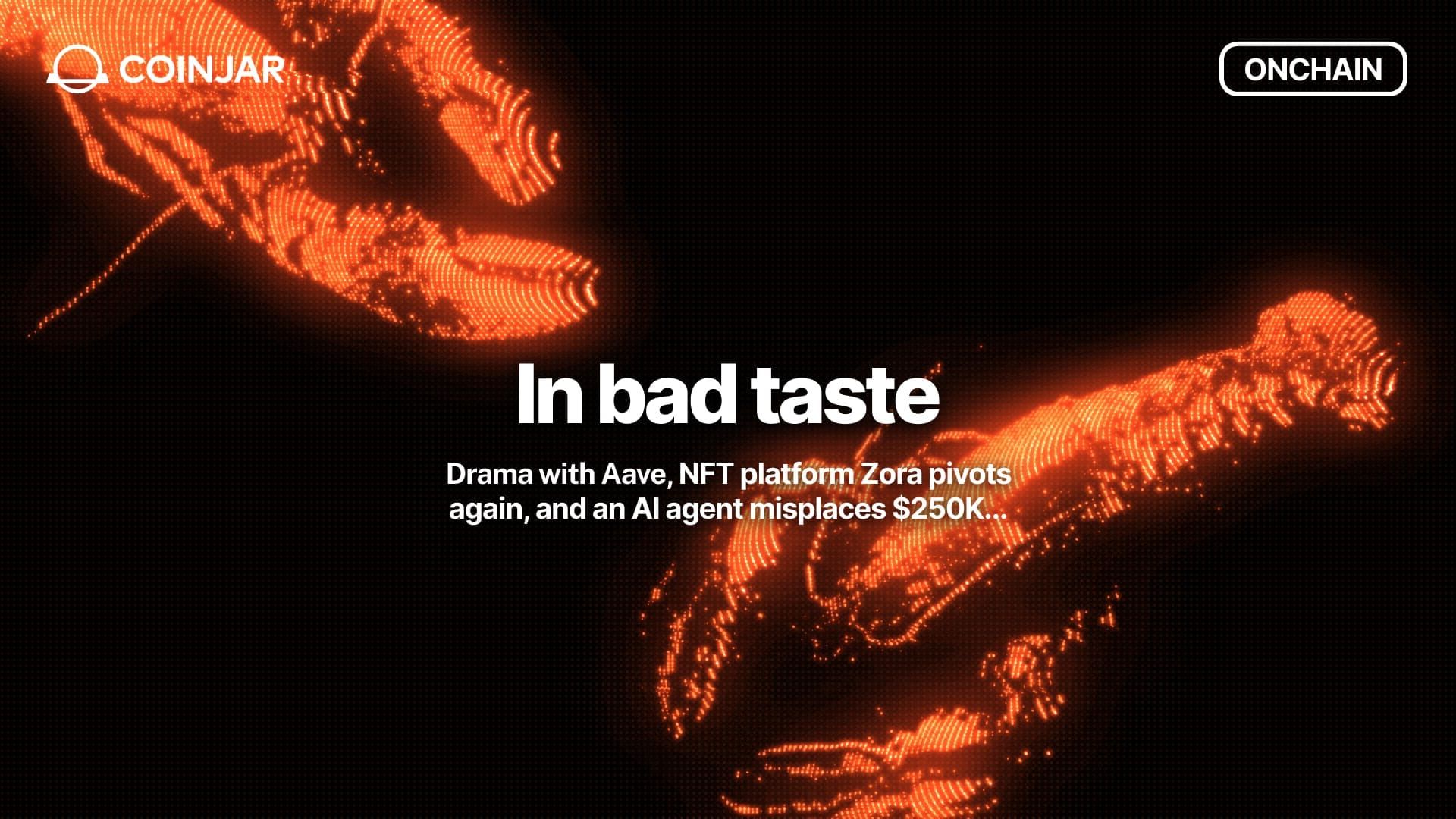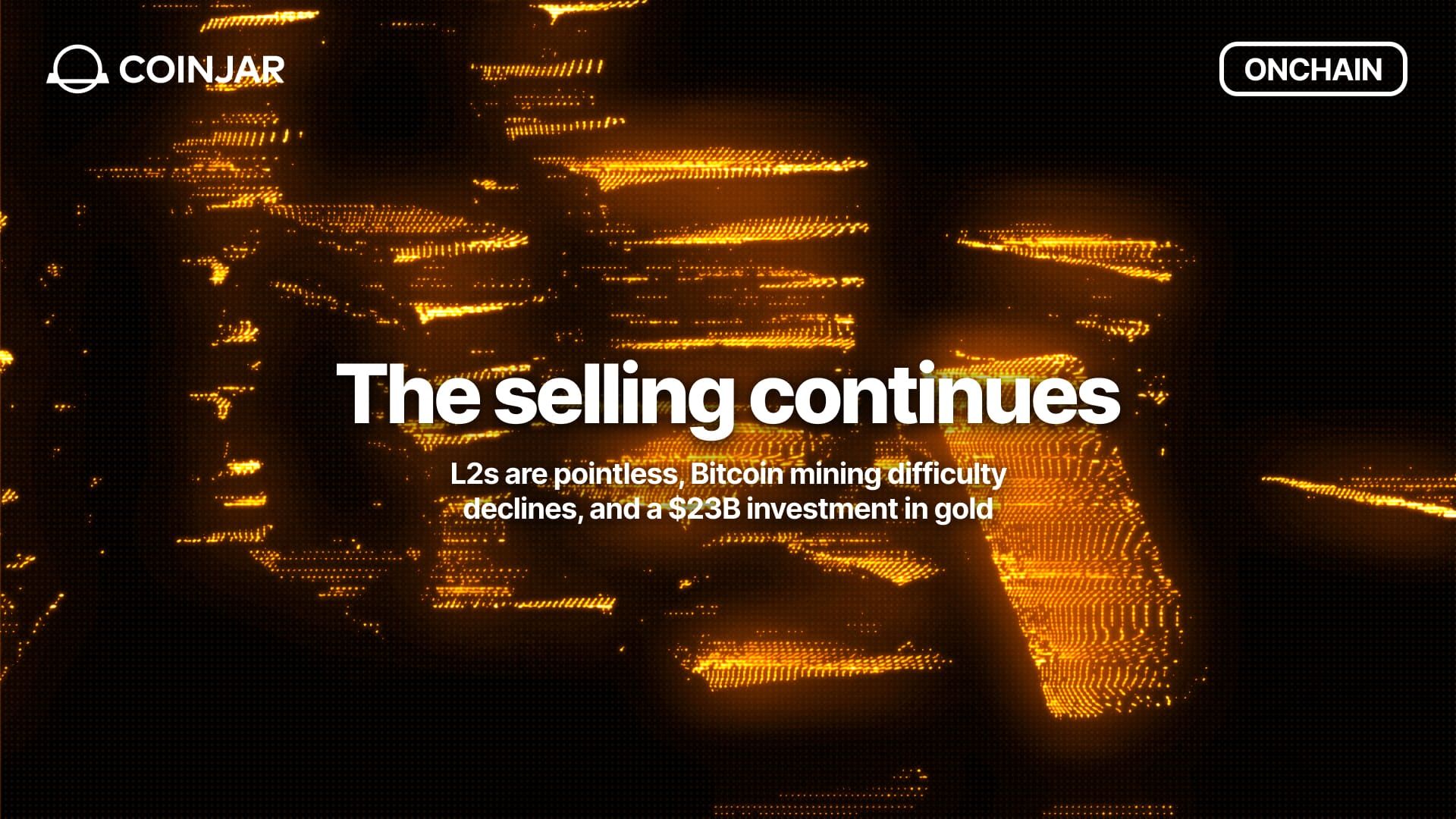Onchain: Drama in Cosmos, an unhinged hacker, and a controversial L2
December 6, 2023
Share this:

Story One
Drama in Cosmos
My theory is that some people are just in crypto because their friends would make fun of them if they watched the Kardashians or Selling Sunset for their dose of drama. Fortunately, crypto never fails to deliver reality TV-type cringe or entertainment. This time, things heated up in the Cosmos ecosystem. Cosmos is an ecosystem of independent chains going about their business but connected through the central cosmos blockchain, secured by the Atom token.
Recently, a governance vote was approved that would cut the inflation rate of the Atom token down to an average of 10%. Reducing inflation will eventually be good for token prices and encourage the use of Atom in DeFi for those wanting more. So, the yay-sayers argue. However, Cosmos founder Kwon wasn't having it. And to his credit, the vote was tight with 41% in favor and 31.9% against. Good thing that in crypto, we can just fork the chain.
Kwon proposes to fork the existing Atom, creating Atom and Atom 1. The best thing about this scenario is the promise of an airdrop, just like with Luna Classic.
Naturally, cosmos people weren't exactly thrilled by their founder coming back and proposing to fragment their community even further. Nevertheless, some of them like the idea, citing irreconcilable differences that could be resolved that way.
Takeaway: Crypto once again brings us a fascinating governance experiment. If history is anything to go by, one of these forks will become irrelevant rather quickly.
Story Two
An unhinged hacker
If you just executed a complex exploit on a DeFi protocol, draining it of more than $50 million, do you lay low or go all in sending onchain messages to the company you exploited? While most of us would opt for the first option, hoping not to be discovered by law enforcement, this hacker is built differently. After ridding KyberNetwork of more than $50 million worth of crypto, the hacker told the team he needed to rest first before entering negotiations.
In response to the hack, the KyberNetwork DAO offered 10% of the funds as a bounty for returning users' funds, yet the hacker, who calls himself "Kyber Director," wasn't impressed. His counteroffer was sent on-chain and outlined his demands, including gaining control over the company and the governance mechanism. Kyber Director further clarified it was his final offer, and if not accepted before December 10th, the "treaty" would fall through.

Takeaway: If you want to run a company but can't be asked to do the hard work, why not just exploit one and force them into coercion? While it'd be interesting to watch, chances are this hostile takeover won't succeed because getting control over a company still requires some level of personal identification.
Story Three
A controversial L2
L2s have become so common that we just shrug our shoulders and move on with our days when yet another one launches. With Blast, things are different. This Layer-2 has already accumulated more than $600 million in value locked - which is close to the entire TVL in Solana - months before it's scheduled to go live.
The innovation in Blast is at the financial level at best, as it offers to stake users' funds in Lido and return ETH rewards. Add to that a Tupperware-type pyramid scheme where influencers get unlimited invites (points), and the promise of an airdrop and crypto degens will hand you all their money.
Before you FOMO in, though, don't forget that currently, there is only a one-way bridge, and you aren't depositing into a Layer-2 but a 3/5 multisig. 🚩
Needless to say, their main investor, Paradigm, wasn't amused as this wasn't good for their Giga brain image.
Takeaway: Crypto investors love their investments like I like my men. Full of red flags with the outlook of quick rewards and a rollercoaster ride.

Fact of the week: The term red flag dates back to the 18th century when red flags started being used in warfare to signal danger or an army preparing for battle. Eventually, it found more metaphorical use, indicating the need for caution.
Naomi for CoinJar
The above article is not to be read as investment, legal or tax advice and takes no account of particular personal or market circumstances; all readers should seek independent investment, legal and tax advice before investing in cryptocurrencies. This article is provided for general information and educational purposes only. No responsibility or liability is accepted for any errors of fact or omission expressed therein. CoinJar, Inc. makes no representation or warranty of any kind, express or implied, regarding the accuracy, validity, reliability, availability, or completeness of any such information. Past performance is not a reliable indicator of future results.
Share this:
On/Offchain
Your weekly dose of crypto news & opinion.
Join more than 150,000 subscribers to CoinJar's crypto newsletter.
Your information is handled in accordance with CoinJar’s Privacy Policy.
More from CoinJar Blog

Onchain: In bad taste
February 25, 2026ICYMI, the tech bros have once again discovered taste, so get ready to be lectured by dudes who think it's acceptable to live with one ceiling light on what to wear and consume....Read more
Onchain: The selling continues
February 11, 2026Until morale improves, or so I hope. Story One L2s are pointless Tweets the guy who advocated for them as part of the Ethereum scaling roadmap. Perhaps to deflect from his...Read more
Onchain: Lots of things on sale
January 28, 2026Story One Crypto Social for Sale Been an interesting time to observe what happens to the still-standing crypto social networks. Aave, a leading DeFi protocol and creator of...Read moreYour information is handled in accordance with CoinJar’s Privacy Policy.
Copyright © 2025 CoinJar, Inc. All rights reserved.
CoinJar, Inc. is a registered Money Services Business with FinCEN and licensed as a money transmitter, NMLS #2492913. For a list of states in which CoinJar, Inc. is licensed or authorized to operate, please visit here. In certain other states, money transmission services are provided by Cross River Bank, Member FDIC.
This site is protected by reCAPTCHA and the Google Privacy Policy and Terms of Service apply.